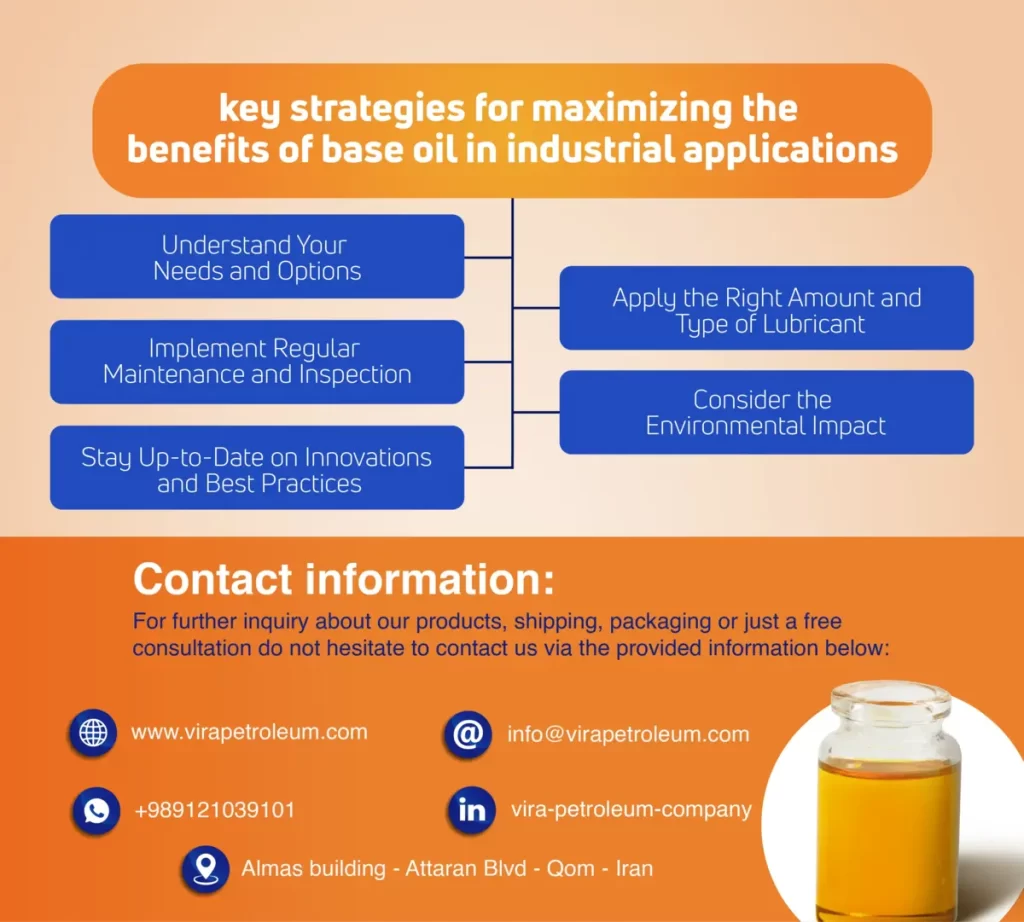Base oil is a key component in many industrial applications, from lubricants and hydraulic fluids to metalworking fluids and transformer oils. With so many different types of base oils available, each with its own unique set of benefits, it’s important to understand how to choose the right one for your specific industrial needs.
In this article, we’ll explore the benefits of base oil for industrial applications and provide a comprehensive guide to understanding its various types, applications, performance factors, environmental impact, and maintenance best practices.

What is Base Oil and Why is it Important for Industrial Applications?
Base oil is a refined petroleum product that serves as the primary ingredient in many industrial lubricants and fluids. It is produced by removing impurities and other components from crude oil, resulting in a clear, colorless liquid that can withstand high temperatures and pressure.
One of the primary benefits of base oil is its ability to reduce friction between moving parts in industrial machinery, which can improve efficiency and reduce wear and tear. It also provides a protective barrier against corrosion, rust, and other forms of degradation, extending the lifespan of machinery and equipment.

Different Types of Base Oil and their Advantages
There are several different types of base oil, each with unique advantages and disadvantages. Some of the most common types include:
Group I base oils: These are the least refined and typically used in less demanding applications, such as general lubrication or metalworking fluids.
Group II base oils: These are more refined than Group I oils and offer better performance in higher temperature and pressure applications.
Group III base oils: These are highly refined and offer the best performance and stability in industrial applications, making them ideal for high-performance engines, hydraulic fluids, and more.
Group IV and V base oils: These are synthetic base oils that offer even higher levels of performance and stability in extreme conditions.

Applications of Base Oil in Industrial Machinery and Equipment
Base oil has a wide range of applications in industrial machinery and equipment, including:
Lubricants: Base oil serves as the primary ingredient in many lubricants, reducing friction and wear between moving parts in engines, transmissions, and other machinery.
Hydraulic fluids: Base oil is often used as a hydraulic fluid, providing the necessary pressure and lubrication for hydraulic systems in heavy machinery and equipment.
Metalworking fluids: Base oil is used in metalworking fluids to reduce heat and friction during the machining process, ensuring a smooth finish and preventing tool wear.
Transformer oils: Base oil is used as a dielectric fluid in transformers, providing insulation and preventing electrical breakdown.
virgin and recycled base oil sn 150

How to Choose the Right Base Oil for Your Industrial Needs
Choosing the right base oil for your industrial needs depends on several factors, including the application, operating conditions, and performance requirements. Some key considerations include:
Viscosity: Base oils come in a range of viscosities, with thicker oils typically used in high-temperature and high-pressure applications.
Additives: Many base oils contain additives to enhance their performance, such as anti-wear agents, rust inhibitors, and viscosity improvers.
Compatibility: It’s important to choose a base oil that is compatible with your machinery and equipment, as using the wrong oil can cause damage and reduce performance.
Environmental impact: Some base oils are more environmentally friendly than others, so it’s essential to consider the environmental impact of your choice.

Base Oil Performance and Efficiency: Factors to Consider
When it comes to base oil performance and efficiency, there are several factors to consider. One of the most important factors is the viscosity of the base oil. The viscosity of the base oil can affect the ability of the oil to flow through the lubrication system and provide adequate lubrication to the moving parts. A higher viscosity base oil may provide better lubrication at high temperatures but may not flow as easily at lower temperatures. On the other hand, a lower-viscosity base oil may provide better lubrication at low temperatures but may not provide adequate lubrication at high temperatures. Another factor to consider is the volatility of the base oil, which can affect the oil’s ability to resist evaporation and maintain its lubricating properties over time. Additionally, the base oil’s ability to resist oxidation can impact its performance and efficiency, as oxidation can lead to the formation of deposits and sludge that can reduce the effectiveness of the lubricant. Ultimately, selecting the right base oil for a specific application requires considering a range of factors and balancing the trade-offs between performance and efficiency.

Maximizing the Benefits of Base Oil for Enhanced Industrial Performance
To fully realize the benefits of base oil, it is essential to take a holistic approach to industrial lubrication. From selection and application to maintenance and disposal, every step of the process can have an impact on performance, efficiency, and sustainability. By implementing best practices and staying up-to-date on the latest innovations, industrial operators can optimize their use of base oil and achieve optimal results.
Here are some key strategies for maximizing the benefits of base oil in industrial applications:
Understand Your Needs and Options
The first step in selecting the right base oil is to clearly define your needs and priorities. Consider factors such as equipment type and operating conditions, as well as performance requirements such as viscosity, wear protection, and thermal stability. With a clear understanding of your needs, you can evaluate different types of base oil and choose the one that best meets your requirements.
Apply the Right Amount and Type of Lubricant
Once you have chosen the right base oil, it is important to apply it correctly. This means using the right amount and type of lubricant, as well as ensuring proper distribution and coverage. Over-lubrication can lead to excess heat, wear, and energy consumption, while under-lubrication can cause friction, corrosion, and premature failure.
Implement Regular Maintenance and Inspection
To ensure continued performance and longevity, it is essential to implement regular maintenance and inspection practices. This includes monitoring lubricant levels, checking for contamination and wear, and replacing or topping up lubricant as needed. Regular inspections can also help identify potential issues before they become serious problems.
Consider the Environmental Impact
In addition to performance considerations, it is important to consider the environmental impact of your lubrication practices. This includes factors such as toxicity, biodegradability, and waste management. By choosing environmentally friendly lubricants and implementing sustainable disposal practices, you can minimize your impact on the environment and reduce your carbon footprint.
Stay Up-to-Date on Innovations and Best Practices
Finally, it is important to stay up-to-date on the latest innovations and best practices in lubrication technology. This includes keeping an eye on emerging trends, attending industry events and training sessions, and networking with other professionals in the field. By staying informed and engaged, you can ensure that you are always using the most effective and efficient lubrication strategies.
conclusion
In conclusion, base oil offers various benefits for industrial applications, including improved performance, efficiency, and sustainability. By understanding your needs and options, applying the right amount and type of lubricant, implementing regular maintenance and inspection, considering the environmental impact, and staying up-to-date on innovations and best practices, you can maximize the benefits of base oil and achieve enhanced industrial performance.
choosing the right base oil for your industrial application can have a significant impact on the performance and efficiency of your machinery and equipment. While there are various types of base oils available on the market, it’s important to select a high-quality base oil that meets your specific needs. As a leading producer of base oil in Iran, Vira petroleum is committed to providing superior-quality base oils that can enhance the performance and longevity of your equipment. Our experienced team is always available to answer your questions and help you select the right base oil for your application. To get in touch with us and learn more about our products and services, please contact us through the communication channels provided. We look forward to working with you and providing the base oil solutions you need for your industrial applications.

